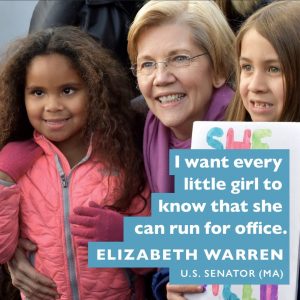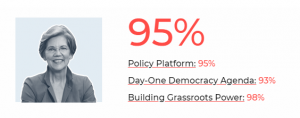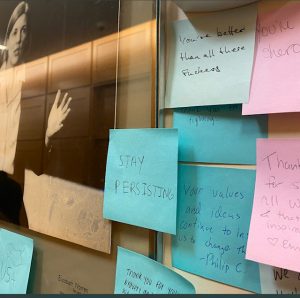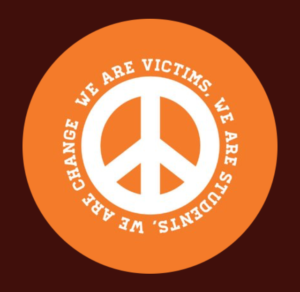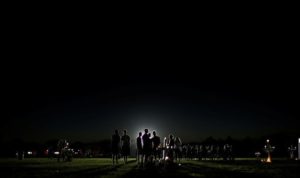Connie Schultz
Nevertheless, she persisted.
March 5, 2020A Not-So-Super Tuesday
By Connie Schultz
Last week, I sat on a stage in front of more than 200 women in Columbus, Ohio, and tried to answer a simple question.
I don’t remember exactly how interviewer Angela Pace asked it, but I heard it this way: What do you want your granddaughters to remember about you?
To my embarrassment, my eyes teared up and my voice began to quiver.
It’s been such a long three years.
We have seven grandchildren: four boys and three girls. I love them equally, as I made clear that day from the stage. But we were talking less than a week before Super Tuesday, when most political punditry had already congealed around two presumed front-runners, Joe Biden and Bernie Sanders.
Elizabeth Warren, the smart, talented, compassionate senator from Massachusetts, was already invisible, right before their eyes. Like millions of other women, I still see her and the hope she always brings with her. It’s as bright and crystalline as hydrangeas in the dusk’s light, glistening after a soft summer rain.
What do I want my granddaughters to remember about me?
My love for my grandchildren keeps my heart on the brink of combustion, but when I think of Jackie, Carolyn and Ela, ages 5, 4 and 2, something else kicks in; I can’t deny it. I’m old enough to know which dreams died but young enough to remember when I thought they defined who I — who we — would be.
I try never to lead with my injuries, but it’s one thing to work hard to get over a disloyal love. A heart can heal, after all. It’s something quite different when the betrayal never comes to an end.
Once again, it seems, we will have to wait at least another four years to see a woman sworn in as president of the United States.
“It’s not because she’s a woman,” people tell me.
“It’s because she’s that woman,” people tell me.
“It’s because of Hillary’s loss that it feels like a woman couldn’t win,” people tell me.
You can tell me and you can tell me and you can tell me — but let me tell you: There’s not a lie I haven’t heard about what a woman can and cannot do. At my age, every act of sexism and misogyny is an encore production.
Jessica Valenti, a brilliant feminist writer two decades younger than me, wrote this after Super Tuesday, for Medium:
“Even just supporting Warren has come with an unbearable amount of misogynist condescension. I’m tired of being told that I’m a single-issue voter because I care about a candidate’s gender, even if it’s not the only thing I care about. I’m over being made to feel as if representation for half the population isn’t a necessary and radical political position. I don’t appreciate being told that I’m either anti-revolution because I didn’t support Bernie Sanders or unrealistic because I won’t vote for Joe Biden. I especially resent the theory being bandied about that Warren somehow ‘stole’ votes from Sanders; it’s nonsense.”
If you had told me 20 years ago that we’d still be having this conversation about the limitations of women, the only thing I would have allowed you was a running start to get out of my way. Our daughters aren’t much younger than Valenti, which might be why these words of hers took my breath away:
“Whoever the nominee is, their campaign is going to have to come to terms with the intense misogyny so many female voters have dealt with — and understand that it’s an issue we care deeply about. And their supporters are going to have to let us be sad — depressed, even — that once again we’re going to watch a race to leadership between old white men.”
Will we vote for that nominee? Of course, we will, in droves. We love our country.
What do I want my granddaughters to remember about me?
All those little, big things. How much I loved them. How I kept a book of the smart and funny things they said. How I lined our walls with their photos, year after year.
Still, why did I cry?
Maybe it’s because I don’t take for granted that I will live long enough for them to have many memories of me.
Maybe it’s because I hope that, in their toughest moments, long after I’m gone, my persistent opposition to this president’s racism and misogyny will remind them that this is who we are, we women in this family.
Or maybe it’s simpler than that. Maybe I cried because I, too, needed a moment to be sad, after all these years.
Connie Schultz is a Pulitzer Prize-winning columnist and professional in residence at Kent State University’s school of journalism. She is the author of two non-fiction books, including “…and His Lovely Wife,” which chronicled the successful race of her husband, Sherrod Brown, for the U.S. Senate. Her novel, “The Daughters of Erietown,” will be published by Random House in Spring 2020. To find out more about Connie Schultz (schultz.connie@gmail.com) and read her past columns, please visit the Creators Syndicate webpage at www.creators.com.
https://www.creators.com/read/connie-schultz/03/20/a-not-so-super-tuesday
UPDATE
“DREAM BIG. FIGHT HARD.”
Ezra Levin, co-founder and co-executive director of Indivisible Team
“For the record, Warren was the top scoring candidate on Indivisible’s scorecard and would have been an incredible President.”
Elizabeth Warren’s tenured photo in the halls of Harvard University. Supporters and students left their comments for her on the day she suspended her campaign.
“…we need to get our of their way.”
February 24, 2018“I wanted to make sure that even if our souls were left behind on that classroom floor, our voices would echo on to the halls of Congress.”
-Parkland shooting survivor David Hogg
What History Says About the Parkland Moment
How high school students hope their activism will change gun legislature. History shows how that could – and couldn’t – happen.
by Karen Yuan
The teenage survivors of the Parkland shooting have become nationally prominent activists for gun control almost overnight. But while they’ve drawn attention to their positions, these students will face an uphill journey: Yesterday, the Florida House voted down a motion to consider banning assault weapons—as Stoneman Douglas students watched from the gallery.
After mass shootings, discussions around gun violence—especially gun control legislation—often flare up and then die down, without new legislation, as the news cycle moves on. With help from our archives editor, Annika Neklason, I dug into the Atlantic archives, looking for insights into what might come out of this moment—and what might not.
THE PARKLAND MOMENT: AN ATLANTIC HISTORY
-
The weapon used by the Parkland shooter, the AR-15, has a storied history. The weapon at the center of today’s debate took an unusual path to prominence. James Fallows explored in 1981 how the AR-15 was developed, advocated for, and modified in the military. In the 1960s, after a series of evaluations, the Defense Department had recommended its lightness, reliability, and “lethality.” The weapon was soon deployed in Vietnam. But without a few more bureaucratic interventions, it might never have become notable.
-
A proto-school shooting in 1988 looks eerily similar to those of today. That year, in Virginia Beach, a student used a semi-automatic weapon he’d bought from a federally licensed dealer without facing checks to shoot teachers and classmates. In 1993, Erik Larsen said that gun manufacturers, dealers, and regulators “virtually assure [the] eventual use [of guns] in … school yards of America.” That was five years before Columbine.
-
The Clinton-era assault weapons ban passed in Congress by only one vote. In 1994, Bill Clinton signed a law that restricted the number of military features a gun could have and banned large capacity magazines for consumer use. But in Congress, many opposed it, wrote Patrick Griffin, Clinton’s chief congressional affairs lobbyist. And by strong-arming the passage of the law, Clinton helped to create the intense partisanship that now defines Congress—which his party lost to the Republicans that year. His victory “stands as an enduring cautionary tale.” The law expired in 2004.
-
The Parkland students may already understand that change won’t come easy. What sets Parkland apart, wrote Robinson Meyer last week, is how its teenagers are familiar with the reality of “a school for children [becoming] a charnel house.” They’ve grown up observing a lack of change. They were born after Columbine shocked their parents’ generation. “So when that hideous transformation struck their school,” wrote Meyer, “they already knew what they wanted to do.” And their perspective is recasting an “otherwise clichéd national debate.”
NPR
NPR’s Ari Shapiro speaks to Nicole Hockley, who lost her son Dylan during the mass shooting at Sandy Hook Elementary School, about offering support to parents who lost a child in last week’s school shooting in Parkland, Fla. She went to Florida to help parents there, and went with them to the White House.
“…and I just said to them, you know, if you keep fighting all the time, it’s draining, it’s negative and it can destroy you. But if you stay focused on the win and on something constructive and what you’re – you know, focus on the end game, what you’re trying to achieve, that’s going to keep you motivated and keep you going because they’ve got a lot of momentum now.
And they’re building up to, you know, the March 24 March For Our Lives. And they have a lot of momentum in the country behind them. And I was saying, you know, you need to also focus on March 25 and beyond because eventually the media will turn away. The spotlight will go away. And it’s how you use your voices in that silence because that’s when the long-term battle really starts.”
[…]
“…it was like Sandy Hook all over again. And everywhere I went – the school, the hospital, the disaster center – I was just triggered on every single level to the point that I actually got incredibly physically sick on the weekend because I think my body just crashed. But it’s – and even seeing the media now, the clips of the kids leaving the school and the crying, it’s Sandy Hook all over again five years later. And it kills me that we’re still allowing our kids to die and not taking enough actions to protect them. That’s just – as a person, as a mother, that’s just heartbreaking.”
CNN
More than 800,000 students live in school districts where shootings have happened. That’s 2% of the US population.
Entire communities are damaged, from students who escaped to those attending schools in the area, to parents, friends, neighbors, clergy. As one Parkland, Florida, rabbi put it after the attack there a week ago, a shooting reverberates throughout the population — no one is truly untouched by such a tragedy.“The entire community is torn and broken. Every child that was killed has five or 10 best friends that watched it happen and that dodged a bullet,” Rabbi Shuey Biston told NPR on Friday. “And we’re grieving together. We’re mourning together.”
https://www.cnn.com/2018/02/21/politics/school-districts-that-have-seen-shootings/index.html
The Eagle Eye is a student newspaper written and published by the students at Marjory Stoneman Douglas High School in Parkland, Florida. They continue to report post the massacre and community tragedy.
MSD mourns the loss of students and teachers at candlelight vigil
Connie Schultz is a Pulitzer Prize-winning columnist and professional in residence at Kent State University’s school of journalism. To find out more about Connie Schultz (con.schultz@yahoo.com) and read her past columns, please visit the Creators Syndicate webpage at www.creators.com.
“We need to get out of their way.”
And the Children Shall Lead Us
by Connie Schultz
“There’s always been a certain percentage of Americans who don’t age well. Their regrets for their own wasted youth or their misspent lives harden them and make them all-too-eager to see the next generation fail. The only thing that’s changed for people like that is the forum for their rage.
If you are even tempted to think they’ll run out of steam, I suggest you get off your couch and out of those chatrooms and go meet some of the young people of this country.
Rush to do this. It’s only a matter of time before they leave you behind.”
https://www.creators.com/read/connie-schultz/02/18/and-the-children-shall-lead-us
In Parkland, journalism students take on role of reporter and survivor
The day after the shooting at Marjory Stoneman Douglas High School in Parkland, Florida, Melissa Falkowski texted her students. As the school’s newspaper adviser, the teacher knew she and her students had a responsibility. “[I told them] nobody could tell this story the way that we could tell it,” she says. “The kids really embraced that.”
On that fateful Wednesday afternoon, their community lost 17 of its own—a soccer player, football coach, geography teacher, and member of the marching band among them—after a gunman opened fire at the school. Already, members of the school newspaper, The Eagle Eye, along with its broadcast journalism program, WMSD-TV, are sharing their experiences in their own outlets and in the national spotlight, treading the increasingly murky line between journalism and activism.
Senior David Hogg, who is WMSD’s news director, interviewed his fellow classmates during the massacre and has also become one of the most visible faces in its aftermath. The thoughtful, media-savvy student journalist has been vocal on cable news, passionately proclaiming on places like CNN: “We’re children. You guys are the adults….Work together, come over your politics and get something done.” Delaney Tarr, a senior and another of Garner’s students, delivered a rousing speech at a rally on Saturday, calling for swift and immediate change: “Because of these gun laws, people that I know, people that I love, have died, and I will never be able to see them again.” A total of 43 students belong to school’s print/online journalism program; another 200 are in the broadcast program.
Columbia Journalism Review
by Alexandria Neason & Meg Dalton
